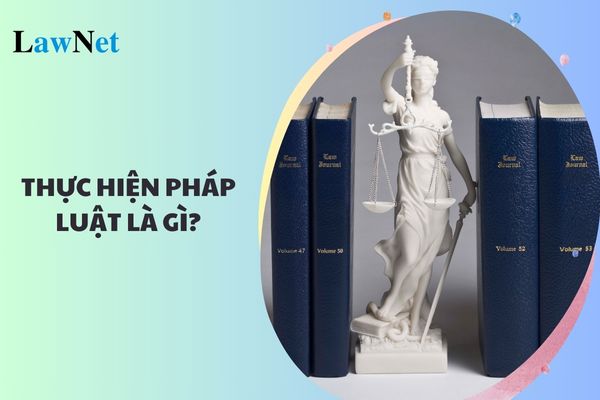What is the implementation of the law? Which agency in Vietnam is responsible for supervising the implementation of the Law on Legal Dissemination and Education?
What is the implementation of the law?
The implementation of the law is one of the concepts that students learn in the subject of State and Law Theory. The implementation of the law is the actual legitimate, purposeful action of legal entities to realize the provisions of the law and bring them to life.
In the theory of state and law, the implementation of the law has 3 characteristics:
- The implementation of the law must be a specific action or actual conduct of a human.
- The implementation of the law must be a legitimate action of the entity.
- The implementation of the law must be the conduct of entities with legal act capacity, i.e., conduct of entities capable of, through their behavior, establishing and executing their legal rights and obligations.
Currently, there are 4 forms of law enforcement: Compliance with the law, Execution of the law, Use of the law, Application of the law. Specifically:
- Compliance with the law: the entity restrains from performing what the law prohibits. The compliance behavior is carried out in the form of non-action.
- Execution of the law: The entity, through its positive behavior, performs what the law requires. The execution behavior is carried out in the form of action.
- Use of the law: The entity executes the manner of conduct that the law permits. The use behavior is carried out in the form of action or non-action.
- Application of the law: This is the form of law implementation in which the state, through competent state agency officers or social organizations empowered by the state, organizes for entities to implement rights or obligations as prescribed by law, change, suspend, terminate legal relationships.

What is the implementation of the law? Which agency in Vietnam is responsible for supervising the implementation of the Law on Legal Dissemination and Education? (Image from the Internet)
Which agency in Vietnam is responsible for supervising the implementation of the Law on Legal Dissemination and Education?
According to Article 27 of the 2012 Law on Legal Dissemination and Education:
Responsibility of local governments at all levels
- People's Councils at all levels have the following responsibilities:
a) Decide on measures to enhance the effectiveness of legal dissemination and education work; allocate local budget estimates for legal dissemination and education work;
b) Supervise the implementation of the legal dissemination and education law.
- People's Committees at all levels have the following responsibilities:
a) Issue programs, plans, and proposals on legal dissemination and education within their authority;
b) Direct, guide, organize, implement, and inspect the legal dissemination and education work;
c) Develop, train, foster, and manage a team of legal reporters, law communicators; standardize the team of teachers teaching civics, and teachers, lecturers teaching law as prescribed by law;
d) Facilitate for organizations, individuals, and enterprises to support legal dissemination and education activities.
Thus, the agency responsible for supervising the implementation of the legal dissemination and education law is the local government at all levels.
What are prohibited acts in legal dissemination and education in Vietnam?
According to Article 9 of the 2012 Law on Legal Dissemination and Education, prohibited acts in legal dissemination and education include:
- Misrepresenting, criticizing the content of the law being disseminated; failing to provide information, documents as prescribed by law; providing false, unlawful, unethical, or socially inappropriate information and documents.
- Using legal dissemination and education to distort the policies and guidelines of the Vietnam Communist Party, the country's laws; propagating hostile policies, causing division of national unity; infringing the interests of the state, the legal rights and interests of organizations and individuals.
- Obstructing the implementation of citizens' rights to information, understanding, and studying the law, as well as the legal dissemination and education activities of organizations and individuals.
- Using the right to information, understanding, and studying the law to hinder the normal activities of organizations and individuals, causing public disorder and social instability.

